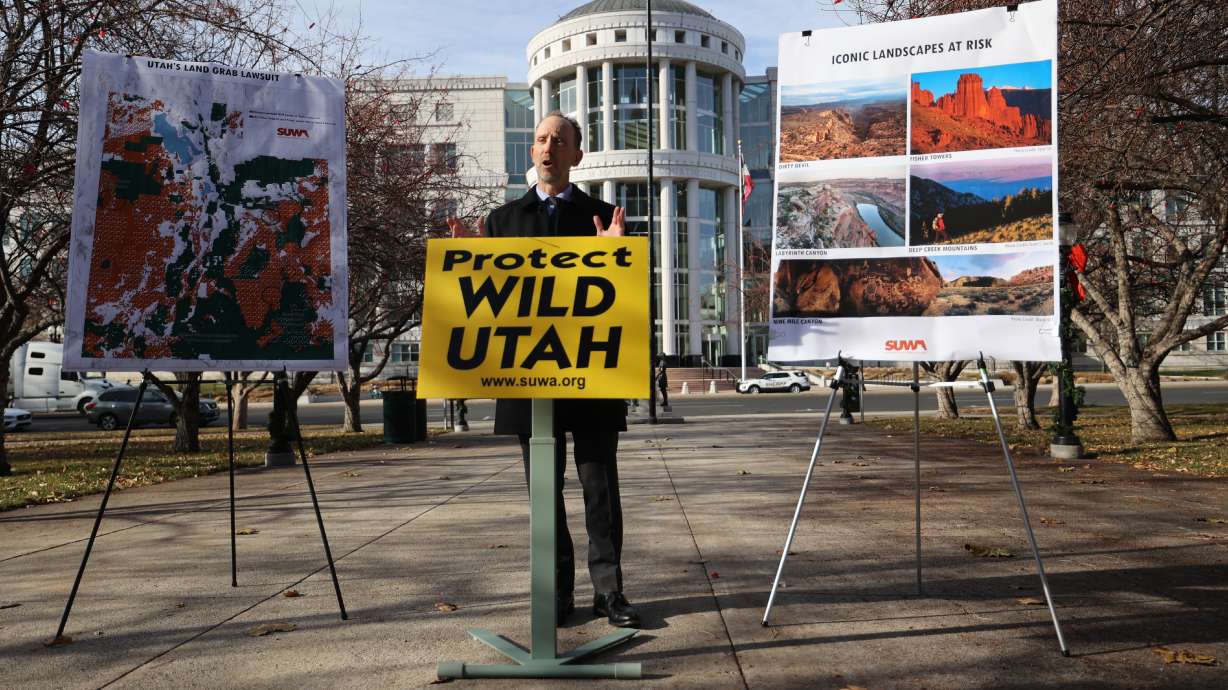Estimated read time: 4-5 minutes
This archived news story is available only for your personal, non-commercial use. Information in the story may be outdated or superseded by additional information. Reading or replaying the story in its archived form does not constitute a republication of the story.
- The Southern Utah Wilderness Alliance is suing Utah leaders over a federal lands lawsuit the state filed in August.
- The conservation group claims Utah's lawsuit violates the Utah Constitution and the Utah Enabling Act.
- The new lawsuit seeks to block Utah's case, which was filed directly to the U.S. Supreme Court.
SALT LAKE CITY — A Utah conservation group says it's suing state leaders over their lawsuit against the federal government that seeks to acquire about 18.5 million acres of "unappropriated" public land, alleging that Utah's lawsuit violates the Utah Constitution and threatens multiple iconic natural features.
Southern Utah Wilderness Alliance leaders filed a motion against Utah Gov. Spencer Cox and Attorney General Sean Reyes in 3rd District Court on Wednesday, asserting that Utah's lawsuit — filed earlier this year — breaches Utah's Constitution and the Utah Enabling Act.
"(We're) challenging the governor and the attorney general's unlawful lawsuit," said Steve Bloch, the organization's legal director. "Utahns love their federal lands, and they're not about to see them simply sold off or given up without a fight."
Utah leaders announced their legal fight in August, challenging the federal government's ability to hold onto "unappropriated lands." The complaint, filed to the U.S. Supreme Court, argues that there is nothing in the U.S. Constitution that authorizes the country to "hold vast unreserved swaths of Utah's territory in perpetuity, over Utah's express objection, without even so much as a pretense of using those lands in the service of any enumerated power."
Over two-thirds of the state is on federally managed land, although it's broken up by different agencies and purposes. The state is seeking to claim about 18.5 million acres of land that it says has not been set aside for any purpose.

"Utah cannot manage, police or care for more than two-thirds of its own territory because it's controlled by people who don't live in Utah," Reyes said during an event at the state Capitol on Aug. 20.
However, the Southern Utah Wilderness Alliance alleges that the state essentially agreed to never stake a claim on the public lands as a condition of its statehood entry, citing the Utah Enabling Act of 1894. It writes that people within the territory agreed to "'forever disclaim all right and title' to unappropriated public lands and lands held by 'Indians or Indian tribes' within the territory's boundaries" as a part of the law that helped Utah gain statehood.
Further, the organization argues the Utah Constitution — passed two years later — "expressly reiterated" this commitment, citing a similar passage in Article III of the document. Bloch adds that the way the U.S. acquired the land — through the Treaty of Guadalupe Hidalgo with Mexico in 1848 — is also why federal land in Utah is controlled differently than in other states on the East Coast.
The organization is seeking a court order that would block Utah's case from being pursued any further.
KSL.com reached out to Cox's office for comment on the new lawsuit but did not immediately receive a response.
Both sides, however, claim similar reasons for their legal efforts. Utah launched a national media campaign over its lawsuit shortly after it was filed, called "Stand for Our Land." Many of those describe a desire to protect beloved open spaces while gaining stewardship over those lands.
"Public lands should stay in public hands, managed in a way that balances recreation, conservation and sustainable use," Lt. Gov. Deidre Henderson says in one video. "By doing so, we ensure that the beauty and benefits or our natural heritage are preserved for future generations."

Bloch remains skeptical of the state's motive. He believes it would allow for millions of acres to be sold off and privatized, closing them off to recreators who use them — a key reason why Southern Utah Wilderness Alliance decided to step in.
"There are countless other camping spots for families, or places to fish, or hunt, or hike, or rock climb that are all at risk right now," he said, standing between a pair of large signs the organization set up in Washington Square Park depicting some of the places it says could be at risk if the state measure succeeds, including Dirty Devil, Deep Creek Mountains, Fisher Towers, Labyrinth Canyon and Nine Mile Canyon.
It's unclear when either legal effort will be settled. Bloch said Wednesday that he believes the Supreme Court will weigh in on the future of Utah's case sometime in early 2025, possibly telling the state to refile in a lower court first.
The Southern Utah Wilderness Alliance isn't seeking an emergency injunction in its case. Bloch said the organization could make adjustments depending on what the nation's highest court says.










